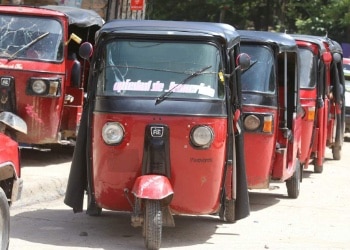The MS13 in Honduras has gone from shaking down motorcycle taxi drivers to owning fleets of the bikes and controlling the organizations that license them, showing the evolution of the gang’s extortion rackets.
In the poor rural neighborhoods that ring San Pedro Sula and surrounding cities, the MS13 now brings in cash by running cooperatives that are in charge of providing authorization numbers for motorcycle taxis, La Prensa reported.
Gang members buy bikes with the proceeds of extortion rackets and drug sales, and put them into circulation with the cooperative’s legal stamp. Even new taxi owners not connected to the street gang have joined the cooperatives, paying a monthly fee of between 1,000 and 2,000 lempiras (about $40 to $80) to receive authorization to work routes.
SEE ALSO: InDepth Coverage of Extortion
Leandro Flores, director of the national anti-gang unit in the country’s northwest sector, said that the cities of Choloma, Villanueva and San Pedro Sula all have neighborhoods in which criminal organizations have total or partial control of motorcycle taxis.
A gang-owned cooperative in Choloma, a sprawling municipality north of San Pedro Sula, has a fleet of 150 vehicles that is said to take in some 300,000 lempiras per month (just over $12,000).
Residents who use the taxis are well aware that the MS13 runs this transportation business.
“In the neighborhood where I live, the MS13 owns the route,” a woman who lives in the southeastern outskirts of San Pedro Sula told La Prensa. “But not all the drivers are gang members.”
InSight Crime Analysis
The MS13-owned motorcycle taxi fleets show how the gang has used its extensive extortion rackets to transform themselves from street thugs into larger mafias.
The gang has long profited from extorting public transport in the Northern Triangle countries of El Salvador, Guatemala and Honduras. The most common method is still to shake down bus operators. For owners who refuse to pay, their drivers are threatened or murdered.
SEE ALSO: Investigation into Extortion in the Northern Triangle
In Guatemala, for example, extortion of buses has raked in as much as $70 million per year for the street gangs. Deadly attacks on buses have also made drivers’ jobs some of the most dangerous in the world. And for Guatemalans who must use the chaotic, aged fleets of buses, commutes have turned into harrowing journeys, as a number of passengers have been killed in gang assaults.
Bus operators in El Salvador have simply made extortion payments part of their formal accounting, deducting weekly payments from drivers’ salaries.
Bus extortion, however, also gave the MS13 an entrance into the public transport business. An informant in a case in El Salvador, for example, revealed how a bus operator turned into a middleman for an MS13 gang leader, helping him to obtain his own buses while extorting owners of other routes.
In Honduras, operators have worked with the gangs to purchase buses and launder money. The gangs have also forced bus owners who can’t pay higher extortion payments to remove their buses from certain routes so that the gang can bring in its own.
One bus operator told La Prensa that the “same extortion money goes to buying buses.”
Given that the neighborhoods in Honduras where the motorcycle taxis operate are also MS13 strongholds, the gang likely began in a similar fashion, simply extorting drivers or bike owners. But members clearly saw an opportunity in turning those extortion rackets into a legitimate, systematic enterprise.
Interestingly, it was the legal cooperatives that provided the vehicle.

